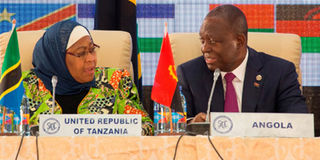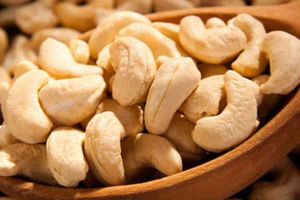Angolans vote today in rare, decisive elections

Vice President Samia Hassa Suluhu chats with her Angolan counterpart, Manuel Domingos Vicente, in a past Sadc summit. The Pretoria meeting held over the weekend discussed many issues including the threat of terrorrism in the region. PHOTO | FILE
What you need to know:
- Set for today, August 23, the Angolan general election will be the third one since the country emerged from a long-drawn civil war in 2002.
Mombasa. Following the Kenyan general election held on August 8, Angola is now poised for crucial polls that will see the exit of veteran president Eduardo dos Santos, who has ruled the country since 1979.
Set for today, August 23, the Angolan general election will be the third one since the country emerged from a long-drawn civil war in 2002.
This time around six parties will be competing for the 220 parliamentary seats, with the ruling MPLA widely viewed as dominant, and its presidential candidate Joao Lourenco as the most likely to succeed the ailing dos Santos.
The poll will come soon after the inauguration of recently re-elected Rwandan president Paul Kagame, who was sworn in for a third term last Friday, and also at a time when the Kenyan presidential vote results have culminated in a tantalising Supreme Court suit.
Filed by Nasa, the country’s opposition coalition, the case will put Kenyan institutions like the Judiciary and the electoral and boundaries commission under a major test.
In an unusually eventful weekend, the Angolan general election will also follow the 37th summit of the Southern African Development Community (SADC).
The Summit of Heads of State and Government held in Pretoria, South Africa over the weekend, and had the theme “Partnering with the private sector in developing industry and regional value-chains”.
Among the objectives of the regional meet was that of “exploring ways of harnessing the public and the private sector to work together to promote sustainable economic development in the region.”
Underpinning the meet’s deliberations will be the urgency of putting in place mechanisms for attaining the goal of industrialisation and sustainable development in the region, while also bolstering ongoing efforts to achieve deeper integration for the member countries.
A major objective is to safeguard political stability and peace and security in the region with a view to ensuring a quality life for all citizens and realising the targeted economic development goals.
While appreciating the fact that their region has been spared the vagaries of the terrorism that has become rampant on the African continent and globally, the participants have reportedly noted that acts of terror are unpredictable.
Bearing that in mind, they have also expressed concern about the fact that religion is a major factor in the terrorist activities reported in recent years around the world.
Amid the general optimism in the Sadc region, however, clouds of uncertainly still hang over countries such as Zimbabwe and South Africa with regard to festering succession issues.
Incidentally Jacob Zuma, the president of the latter country, was hurled into the limelight during the two-day summit even as the 93-year-old Zimbabwean President Robert Mugabe’s arrival in Pretoria was clouded by the shenanigans surrounding First Lady Grace Mugabe, 52.
Controversial at the best of times, the former secretary was under mounting fire for allegedly assaulting a 20-year-old Johannesburg model, Gabriella Engels, with an electrical extension cord while her 10 bodyguards watched.
According to the victim, the furious Grace Mugabe brutally attacked her and two of her friends after finding them in the company of the Mugabe boys, both in their 20s, at the Capital 20 West Hotel in the upmarket business district of Sandton.
“She flipped and just kept beating me with the plug,” the victim reportedly told the News 24 website. “Over and over. I had no idea what was going on. I was surprised... I needed to crawl out of the room before I could run away.”
As for the two Mugabe sons, Robert Jnr. and Chatunga, who live in Johannesburg, they reportedly fled the scene in the midst of their distraught mother’s fury.
Apparently spoilt rotten, the hedonistic young men are widely viewed as overgrown brats and the latest examples of the indiscipline of the progeny of Africa’s political aristocracy.
Regarding summit host President Zuma, he has recently survived the eighth no-confidence motion of his controversy-ridden political career.
Still raring for a good fight, Zuma has now vowed to go after his detractors, particularly those from the ruling ANC party who voted against him during the censor motion held on August 8.
Internal South African political challenges aside, the apparently indomitable President Zuma is today set to assume the rotating Sadc chair from King Mswati III of Swaziland.
Back to Angola, according to the country’s authorities 9,260,403 voters have been registered for the looming polls, amid recent claims that the government has been trying to manipulate the electoral process in order to determine the outcome.
Consequently, there have been spirited protests by civil society activists, seven of whom were recently sentenced to 45 days in jail for their role in a demonstration in the capital Luanda for a credible election




